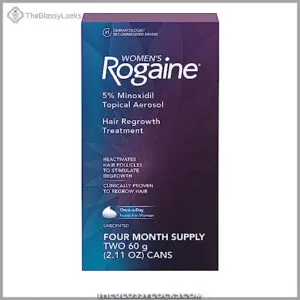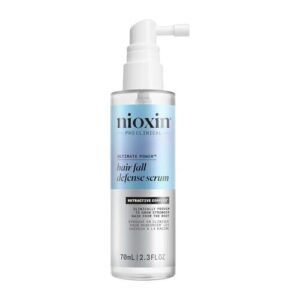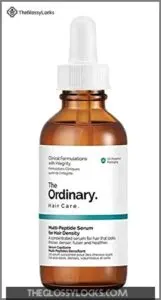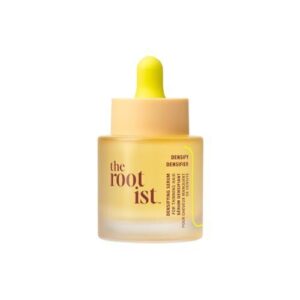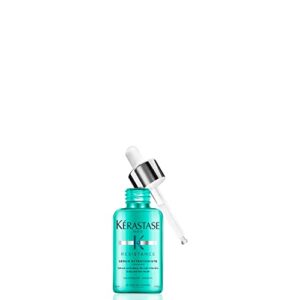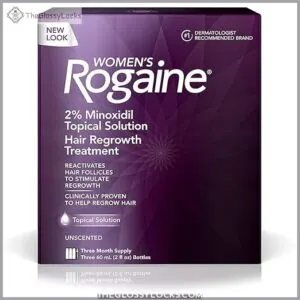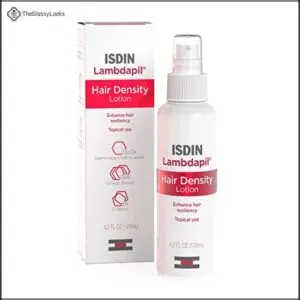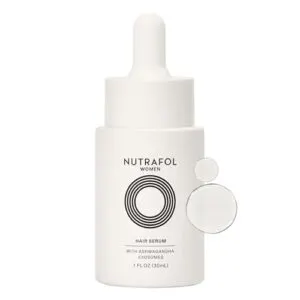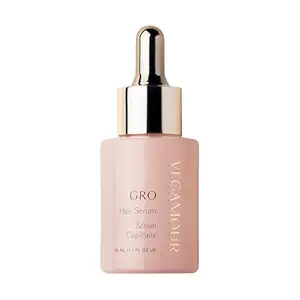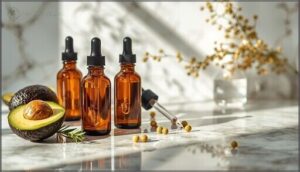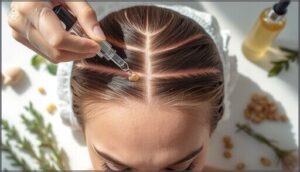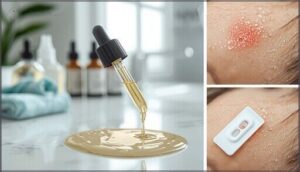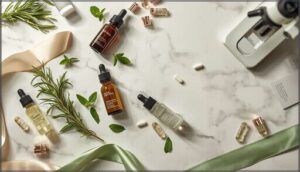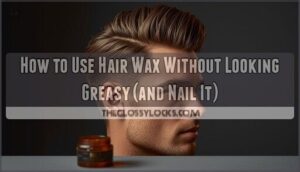This site is supported by our readers. We may earn a commission, at no cost to you, if you purchase through links.
Your bathroom cabinet probably holds at least three products promising thicker hair—but do any of them actually work? The answer isn’t as straightforward as brands want you to believe.
Hair growth serums can be effective, but only when they contain specific, clinically-proven ingredients like minoxidil, peptides, or DHT blockers that target the biological mechanisms behind hair loss. The catch? Results depend entirely on matching the right active ingredients to your specific type of shedding, whether that’s androgenetic alopecia, stress-induced telogen effluvium, or simple breakage.
Understanding which formulas deliver real follicle stimulation versus expensive placebo effects gives you the power to reclaim hair density without wasting months on products that can’t possibly deliver.
Table Of Contents
- What Are Hair Growth Serums and How They Work
- The Science Behind Hair Growth Serum Effectiveness
- Top 9 Hair Growth Serums Worth Trying
- 1. Rogaine Minoxidil Hair Growth Treatment
- 2. Nioxin Hair Fall Defense Treatment
- 3. The Ordinary Peptide Hair Serum
- 4. Rootist Hair Thickening Serum
- 5. Kerastase Hair Serum
- 6. Women’s Rogaine Hair Regrowth Solution
- 7. ISDIN Hair Loss Lotion
- 8. Nutrafol Hair Growth Serum
- 9. Vegamour GRO Hair Serum for Hair Thinning
- Key Ingredients That Make Hair Serums Effective
- How to Use Hair Growth Serums Properly
- Choosing The Right Hair Growth Serum
- When to Expect Results and Consult Professionals
- Frequently Asked Questions (FAQs)
- How long does a hair growth serum take to work?
- Is there any serum that will actually make hair grow?
- Does a hair growth serum really work?
- What is a hair growth serum?
- How do I choose the best hair growth serum?
- Can a hair growth serum help thinning hair?
- Do hair growth serums really work?
- Can hair growth serum regrow hair?
- What are the disadvantages of using hair growth serum?
- Is it worth using hair serum?
- Conclusion
What Are Hair Growth Serums and How They Work
Hair growth serums promise to transform your thinning hair by delivering active ingredients directly to your scalp, where follicles need them most. These topical treatments work differently than shampoos or conditioners, targeting the root cause of hair loss rather than just coating strands.
If you’re searching for a formula that actually works, this guide to the best hair growth serums for women breaks down which ingredients deliver real results.
Here’s what you need to understand about their definition, key ingredients, and mechanism of action.
Definition and Purpose of Hair Growth Serums
Hair growth serums are topical liquids designed to nourish your scalp and stimulate hair follicles, targeting the root environment where hair regrowth begins.
They deliver concentrated blends of vitamins, peptides, and botanical extracts directly to follicles, improving scalp health, reducing inflammation, and creating ideal conditions for follicle stimulation.
Unlike heavy oils, serums absorb quickly, supporting growth cycles without residue—giving you control over hair loss naturally. For more insights into how biotin, peptides, and other ingredients contribute to healthy hair growth science, explore expert research on effective serums.
Key Active Ingredients That Promote Hair Growth
Minoxidil stands alone as the FDA-approved champion, extending follicle growth cycles at 2 to 5 percent concentrations—results emerge after three to six months.
Biotin and Peptides reinforce keratin production and follicle signaling, while Caffeine and DHT Blockers like Saw Palmetto tackle shedding at the root.
These Scalp Stimulants deliver your Follicle Boost, transforming dormant roots into active growth sites with consistent use.
A variety of scientifically studied hair ingredients such as herbal extracts, essential oils, and nutritional supplements can also support healthy hair growth.
How Serums Target Hair Follicles and Scalp
Your serum works through targeted absorption, carrying actives past the scalp’s outermost barrier straight to follicle openings via lipid-rich microemulsions.
Follicle Stimulation happens when peptides signal protein production, caffeine boosts microcirculation, and time-released carriers maintain potency for hours.
Scalp Hydration from humectants creates an environment where Hair Growth Mechanisms thrive—while antioxidants neutralize free radicals threatening Follicle Health, and DHT Blockers interrupt miniaturization at the root.
The Science Behind Hair Growth Serum Effectiveness
You can’t achieve real hair growth without understanding what’s actually happening beneath your scalp.
The science reveals how your follicles cycle through phases, which ingredients have clinical backing, and where flashy marketing diverges from biological reality. Here’s what dermatologists want you to know before you invest in any serum.
Understanding The Hair Growth Cycle
Your scalp hosts thousands of hair follicles, each marching through a unique rhythm: anagen (growth phases lasting years), catagen (brief shift), telogen (rest), and exogen (hair shedding).
Most follicles stay in anagen at any time, producing half an inch monthly. Understanding this hair growth cycle reveals why treatments need months to work—disrupted cycle duration or shortened growth phases trigger noticeable hair loss.
Clinical Evidence for Minoxidil and Other Ingredients
Decades of clinical trials prove that topical minoxidil works—FDA-approved concentrations (2 to 5 percent) deliver measurable hair regrowth for androgenetic alopecia, with higher strengths outperforming lower ones after 48 weeks of use.
Minoxidil research shows this ingredient transforms hair follicle activity by:
- Opening potassium channels that energize growth cycles
- Boosting blood flow directly to your scalp
- Activating Wnt signaling pathways for follicle renewal
- Converting into active metabolites through scalp enzymes
Meanwhile, peptides support keratinocyte function, caffeine thickens shafts modestly, and saw palmetto offers mixed androgen-blocking effects—though none match minoxidil’s proven serum efficacy for hair loss treatment.
Realistic Expectations Vs. Marketing Claims
Why do glossy ads promise lush regrowth in four weeks when scientific evidence tells a different story? Marketing tactics exploit your hope, but hair growth serums require three to six months to show modest improvements in scalp health and density.
Marketing tactics exploit your hope, but hair growth serums require three to six months to show modest improvements—not the lush regrowth ads promise in four weeks
Unrealistic claims ignore biology—consumer awareness means recognizing that no serum reverses hair loss overnight, and effective hair regrowth demands patience, not hype.
Top 9 Hair Growth Serums Worth Trying
You’ve got the science down, now it’s time to take control with products that actually deliver. The market’s flooded with promises, but these nine serums stand out for their clinically-backed ingredients, real results, and proven track records.
Whether you’re fighting thinning, shedding, or just want thicker hair, you’ll find a formula here that works with your body’s natural growth cycle.
1. Rogaine Minoxidil Hair Growth Treatment
You’ve likely seen that familiar red and white box, but Rogaine’s Women’s 5% Minoxidil Foam represents the highest standard for a reason. Clinically proven to regrow hair up to 48% thicker, it’s FDA-approved and backed by decades of research.
The once-daily, unscented formula features Tricho-Prime technology, nourishing your scalp while extending the active growth phase of your follicles. Yes, consistency matters—you’ll need months of application—but the science doesn’t lie, and neither do the results for hereditary thinning.
| Best For | Women dealing with hereditary hair loss who want an FDA-approved, clinically proven treatment and don’t mind committing to a daily routine for several months. |
|---|---|
| Form | Foam |
| Price Range | $$ |
| Application Frequency | Once daily |
| Hair Type | All |
| Key Ingredient | Minoxidil 5% |
| Cruelty-Free | Not specified |
| Additional Features |
|
- Clinically proven to regrow hair up to 48% thicker with consistent use
- Once-daily application is more convenient than twice-daily alternatives
- Unscented foam formula is easier to apply and less messy than liquid versions
- Results take months to appear and require ongoing daily use to maintain
- Can cause scalp irritation, itchiness, or unwanted hair growth in other areas
- Long-term cost adds up, making it a significant ongoing expense
2. Nioxin Hair Fall Defense Treatment
If stronger hair anchorage sounds like your ticket to reclaiming control over thinning strands, Nioxin’s Hair Fall Defense Serum delivers clinical backing. You’re getting Sandalore to stimulate follicles, Niacinamide for scalp barrier support, Caffeine to boost circulation, and Lauric Acid’s antimicrobial cleansing—all working together to reduce shedding.
Apply this leave-in treatment daily to dry or damp scalp, massage it in, and don’t rinse. Over eight weeks, you’ll notice thicker-appearing hair and reduced breakage, transforming your relationship with every strand.
| Best For | People dealing with noticeable hair thinning or breakage who want a clinically-backed daily treatment that strengthens hair from the roots. |
|---|---|
| Form | Drop |
| Price Range | $$$ |
| Application Frequency | Daily |
| Hair Type | All |
| Key Ingredient | Niacinamide |
| Cruelty-Free | Not specified |
| Additional Features |
|
- Contains four active ingredients (Sandalore, Niacinamide, Caffeine, Lauric Acid) that work together to reduce shedding and improve scalp health
- Easy to use as a leave-in treatment—just apply daily to scalp without rinsing
- Shows visible results in thickness and reduced breakage within eight weeks
- Strong sandalwood scent that some users find overpowering
- Expensive at $50 for 2.3 ounces
- May cause tingling or irritation, and might not work for severe hair loss cases
3. The Ordinary Peptide Hair Serum
When peptide technology meets affordability, you’re looking at The Ordinary Multi-Peptide Serum for Hair Density. This lightweight formula blends REDENSYL, Procapil, CAPIXYL, BAICAPIL, AnaGain, and high-solubility caffeine to target thinning areas without weighing hair down.
At $24 for two ounces, it’s cruelty-free, vegan, and alcohol-free. Apply nightly to your dry scalp with the dropper, focusing on sparse zones.
You’ll notice improved fullness and density over several weeks, not overnight miracles—but consistent use promotes healthier-looking hair through scalp environment optimization.
| Best For | People dealing with thinning hair who want an affordable, science-backed serum that supports hair density without harsh chemicals or heavy residue. |
|---|---|
| Form | Serum |
| Price Range | $ |
| Application Frequency | Daily |
| Hair Type | All |
| Key Ingredient | Peptides |
| Cruelty-Free | Yes |
| Additional Features |
|
- Packed with six proven peptide technologies (REDENSYL, Procapil, CAPIXYL) at a fraction of salon treatment costs
- Lightweight, non-greasy formula that works overnight without interfering with your styling routine
- Clean ingredient list—vegan, cruelty-free, and free from alcohol, silicones, and fragrances
- Results take weeks of consistent use, so you’ll need patience before seeing noticeable changes
- Effectiveness varies widely between users, with some reporting little to no improvement
- Occasional packaging issues like unsealed bottles have been reported by customers
4. Rootist Hair Thickening Serum
When fermented botanicals meet densifying peptides, you get THE ROOTIST Hair Thickening Serum—a $70, one-ounce formula that claims to reduce hair fallout by up to 85%. Its Rootbiomic Ferment base aids scalp microflora, while Centella Asiatica and Panax Ginseng soothe irritation and boost follicle vitality.
The lightweight, non-greasy texture works across all hair types, including chemically-treated strands. Apply daily to clean scalp, targeting thinning zones. You’ll need patience and consistency—results unfold over months, not days, but the probiotic-inspired approach optimizes conditions for healthier, fuller hair growth.
| Best For | Anyone dealing with thinning hair who’s willing to invest in a science-backed serum and commit to daily use for several months to see real results. |
|---|---|
| Form | Serum |
| Price Range | $$$ |
| Application Frequency | Daily |
| Hair Type | All |
| Key Ingredient | Peptides |
| Cruelty-Free | Not specified |
| Additional Features |
|
- Clinically impressive claim of reducing hair fallout by up to 85% with a unique probiotic-inspired formula
- Works for all hair types, including color-treated and chemically processed hair, without leaving greasy residue
- Targets multiple stages of the hair growth cycle with potent botanicals like ginseng and turmeric alongside peptides
- Steep $70 price tag for just one ounce of product means it’s a significant ongoing investment
- Requires months of consistent daily application before you’ll notice visible thickness and fullness improvements
- Small bottle size means you’ll be reordering frequently if you’re treating larger areas of thinning
5. Kerastase Hair Serum
If breakage is your hair’s downfall, Kérastase Genesis Serum Fortifiant targets weakened strands with Aminexil, caffeine, and ginger root extract. This 90ml pump bottle reduces shedding from brushing by fortifying fiber strength and supporting scalp microcirculation.
Apply a few drops to damp or dry scalp, massage gently, and don’t rinse—let actives work overnight. Pair with Genesis shampoo for synergy. You won’t regrow lost follicles, but you’ll preserve what you have, creating smoother, more resilient hair that resists manipulation damage.
| Best For | Anyone dealing with breakage, shedding, or weakened hair who wants to fortify strands and support scalp health without heavy residue. |
|---|---|
| Form | Liquid |
| Price Range | $$$ |
| Application Frequency | As needed |
| Hair Type | All |
| Key Ingredient | Ceramides |
| Cruelty-Free | Not specified |
| Additional Features |
|
- Reduces breakage and shedding with a lightweight, non-greasy formula that works on wet or dry hair
- Contains active ingredients like Aminexil and caffeine that strengthen fibers and improve scalp circulation
- Versatile enough for all hair types, especially damaged or fragile strands that need extra protection
- Expensive for a small 1.7 oz bottle that may run out quickly with regular use
- Hair growth results vary widely—some users see little improvement in thinning areas or regrowth
- May require consistent, long-term use (and pairing with other Genesis products) to notice significant changes
6. Women’s Rogaine Hair Regrowth Solution
Women’s Rogaine 5% Minoxidil Foam stands as the only FDA-approved option specifically formulated for female pattern hair loss—a clinical distinction that matters.
Applied once daily to thinning areas, it revives dormant follicles, reverses miniaturization, and extends your growth phase, delivering measurable thickening after several months of consistent use.
The foam formula feels lighter than liquid versions, dries faster, and carries minimal scent. You’ll need ongoing application to sustain regrowth, but the science backing minoxidil is unparalleled.
| Best For | Women dealing with hereditary hair loss or thinning who want the only FDA-approved treatment proven to regrow hair. |
|---|---|
| Form | Liquid |
| Price Range | $$ |
| Application Frequency | Twice daily |
| Hair Type | All |
| Key Ingredient | Minoxidil 2% |
| Cruelty-Free | Not specified |
| Additional Features |
|
- Clinically proven formula that works in five ways to reverse follicle miniaturization and boost regrowth
- Unscented and easy to apply once daily—lighter texture than liquid versions
- Backed by solid science with measurable results after consistent use
- Requires continuous daily use forever to keep results—stop and the progress reverses
- May cause unwanted hair growth in random areas you didn’t treat
- Doesn’t work for everyone, especially on completely bald spots
7. ISDIN Hair Loss Lotion
ISDIN Lambdapil Anti Hair Loss Lotion offers a patented approach, creating a protective microenvironment around your follicles using melatonin, ginkgo biloba, and biotin—ingredients that neutralize oxidative stress and nourish your scalp. You’ll apply this lightweight, non-greasy formula nightly, targeting areas experiencing genetic or hormonal thinning.
At $42 for 4.2 ounces, it’s pricier than some options, and results require several months of consistent use. The spray format allows precise application, though some users report inconsistent packaging.
| Best For | People dealing with genetic or hormonal hair thinning who want a science-backed formula and don’t mind paying more for targeted follicle protection. |
|---|---|
| Form | Lotion |
| Price Range | $$ |
| Application Frequency | Daily |
| Hair Type | All |
| Key Ingredient | D-Biotin |
| Cruelty-Free | Not specified |
| Additional Features |
|
- Patented formula with melatonin, ginkgo biloba, and biotin that fights oxidative stress at the follicle level
- Lightweight, non-greasy spray makes nightly application easy and precise
- Works well for both women with long hair and those with thin, fine strands
- At $42 for 4.2 oz, it’s one of the pricier options on the market
- Results take several months of consistent use before you’ll see noticeable changes
- Some users report packaging issues like unsealed boxes or inconsistent product quality
8. Nutrafol Hair Growth Serum
Nutrafol Growth Activator Serum harnesses Ashwagandha Exosomes—patent-pending technology that delivers bioactive signals directly to your follicles, supporting thicker, stronger strands over time. You’ll also find Irish Moss Peptides and Pea Sprout Extract working to reduce visible breakage and extend your growth phase.
At $49 for one fluid ounce, it’s a premium investment requiring 90 days of nightly application for noticeable results. The vegan, sulfate-free formula absorbs quickly, though some users mention a faint smell and delicate glass applicator.
| Best For | Women experiencing thinning hair or increased shedding who want a clinically tested, vegan serum and are willing to invest in a premium product with a 90-day commitment. |
|---|---|
| Form | Liquid |
| Price Range | $$$ |
| Application Frequency | Daily |
| Hair Type | Women |
| Key Ingredient | Ashwagandha Exosomes |
| Cruelty-Free | Not specified |
| Additional Features |
|
- Patent-pending Ashwagandha Exosome technology delivers bioactive signals directly to follicles for visibly thicker, stronger hair
- Lightweight, fast-absorbing formula that’s sulfate-free, paraben-free, and silicone-free
- Reduces visible breakage and can be layered with other hair growth products
- Expensive at $49 for just one fluid ounce
- Requires consistent nightly use for 90 days before seeing noticeable results
- Some users report a faint unpleasant smell and the glass applicator needs careful handling
9. Vegamour GRO Hair Serum for Hair Thinning
Vegamour GRO serum brings plant-based actives—mung bean, turmeric, and red clover—to your thinning areas without hormones or heavy oils. You’ll find caffeine and biotin revitalizing each strand, plus a probiotic complex supporting your scalp’s microbiome balance.
At $64 for one fluid ounce, it’s a significant investment requiring daily use over three to six months to see gradual fullness improvements. The bergamot-scented, water-based formula won’t weigh down fine hair, though results vary widely and some buyers report receiving expired or counterfeit products from third-party sellers.
| Best For | People with fine or thinning hair who want a hormone-free, plant-based solution and don’t mind investing in a premium product that requires months of consistent use. |
|---|---|
| Form | Water-based |
| Price Range | $$$ |
| Application Frequency | Daily |
| Hair Type | All |
| Key Ingredient | Caffeine |
| Cruelty-Free | Yes |
| Additional Features |
|
- Plant-based formula with caffeine, biotin, and phyto-actives that won’t weigh down fine hair
- Non-greasy, water-based texture with a pleasant bergamot scent
- Vegan, cruelty-free, and free from silicones or hormones
- Expensive at $64 for a 30-day supply with no guarantee of results
- Requires daily application for 3-6 months before seeing noticeable improvements
- Risk of receiving counterfeit or expired products when buying from third-party sellers
Key Ingredients That Make Hair Serums Effective
Not all hair growth serums are created equal, and the difference comes down to what’s actually inside the bottle. Some ingredients have decades of clinical research behind them, while others are newer innovations showing real promise in follicle stimulation and scalp optimization.
Here’s what you need to know about the powerhouse components that can transform your hair from the root up.
Minoxidil: The FDA-Approved Hair Growth Ingredient
When you’re ready to take control of hair thinning, minoxidil stands as the FDA-approved champion that actually delivers follicle stimulation and hair regrowth.
Available as Rogaine in 2 percent and 5 percent formulations, this topical vasodilator boosts scalp health by extending growth cycles and reawakening miniaturized follicles.
But patience matters, since visible hair growth usually appears after 3 to 6 months of consistent use.
Biotin, Peptides, and Caffeine Benefits
You can leverage biotin supplements, peptide therapy, and caffeine effects to tap into your hair’s full power. Biotin reinforces keratin infrastructure, strengthening each hair follicle from within, while peptides signal follicles to shift into active growth phases and boost scalp health.
Caffeine increases local blood flow, countering miniaturization and delivering nutrients precisely where hair growth serums need them most.
Natural Alternatives Like Saw Palmetto and Redensyl
You can utilize saw palmetto benefits by blocking DHT conversion at follicles, slowing miniaturization without a prescription.
Redensyl effectiveness lies in mimicking follicle stem cell signals, extending the growth phase for thicker strands.
These natural hair growth alternatives—often combined with natural oils—improve scalp health tips and herbal remedies when applied consistently, though results take months and work best alongside clinically proven treatments.
How to Use Hair Growth Serums Properly
You can’t tap into your hair’s full potential if you’re applying your serum wrong. The difference between mediocre results and actual transformation comes down to technique, timing, and consistency.
Here’s exactly how to apply hair growth serums for maximum absorption and effectiveness.
Best Application Techniques for Maximum Absorption
Think of serum application like priming a canvas—your scalp preparation sets the stage for real transformation. Start with a clean, completely dry scalp to prevent dilution and boost absorption rates.
Part your hair into sections, applying directly to the skin where hair growth mechanisms live. Use gentle, circular massage techniques for two to three minutes, targeting thinning areas to enhance contact time and scalp health.
Recommended Frequency and Timing
Consistency isn’t a suggestion—it’s the difference between serums that work and bottles gathering dust. Apply your hair growth serum once daily, ideally in the evening when scalp response and absorption rates peak during natural hair regrowth cycles.
- Daily application maintains steady ingredient delivery for ideal scalp health
- Evening timing aligns with circadian hair growth patterns
- Four-hour waiting periods before washing maximize contact time
- Monthly frequency adjustments address changing scalp response
- Three-month minimum commitment reveals true hair care routine effectiveness
Common Mistakes to Avoid During Application
Even minor missteps derail results—patch test 24 hours before full use, checking for redness or itching that signals sensitivity.
Apply hair growth serums only to clean, dry scalps; wet or oily surfaces block absorption. Don’t exceed recommended doses; overapplication risks irritation without boosting effectiveness.
Avoid mixing serums from different brands, which can trigger ingredient interactions that compromise scalp health and proper application of hair serums altogether.
Choosing The Right Hair Growth Serum
Not all hair growth serums are created equal, and choosing the wrong one can waste months of effort and money.
Your specific hair loss pattern, scalp sensitivity, and underlying concerns determine which ingredients will actually work for you. Let’s break down how to match your needs with the right formulation so you’re not throwing darts in the dark.
Identifying Your Specific Hair Loss Type
Before you choose a serum, you need to know what you’re fighting. Androgenetic alopecia reveals itself through crown and vertex thinning in men, diffuse hair loss in women, often with a family history.
Telogen effluvium triggers sudden shedding after stress or illness. Alopecia areata creates distinct patchy baldness.
Traction alopecia stems from tight hairstyles damaging follicle health along your hairline, while scarring forms demand immediate scalp analysis and pattern recognition.
Matching Ingredients to Your Hair Concerns
Once you’ve pinpointed your hair loss pattern, ingredient synergy becomes your weapon. Minoxidil powered hair growth serums target crown thinning, showing density gains after 4 to 6 months.
Peptides and biotin fortify breakage prone strands, optimizing follicle stimulation over 12 weeks. Caffeine boosts scalp health through microcirculation, while saw palmetto blocks DHT for androgenetic patterns—matching ingredients to your hair concerns unlocks real growth optimization.
Considerations for Sensitive Scalp and Hair Type
Scalp sensitivity demands fragrance-free and alcohol-free gentle formulas—patch test before committing to avoid product allergies.
Fine hair requires lightweight serums that won’t flatten roots, while coarse textures handle richer treatments without buildup.
If you’re managing sensitive skin, hypoallergenic options preserve scalp health and hair growth simultaneously. Matching hair texture to product weight optimizes both scalp treatment effectiveness and hair care and maintenance outcomes, making sensitive scalp considerations non-negotiable.
When to Expect Results and Consult Professionals
Hair growth serums don’t work overnight, and knowing when to see results—or when to seek help—can save you months of frustration.
Most people notice changes within three to four months, but certain warning signs mean it’s time to talk to a dermatologist instead of waiting it out.
Beyond topical treatments, your lifestyle choices can either enhance your serum’s effects or quietly sabotage them.
Typical Timeline for Visible Hair Growth
Hair growth serums don’t rewrite your follicle renewal timeline overnight—they enhance the growth cycle you already have. Most people notice subtle fullness, reduced hair shedding, or fine regrowth patterns within 6 to 12 weeks, though meaningful hair regrowth and visible results usually emerge after 4 to 6 months of consistent use.
- Initial improvements in scalp health appear within weeks
- Fine vellus hairs signal early regrowth around month two
- Noticeable density gains require sustained 4-6 month commitment
- Full restoration often demands 12-24 months of dedication
Signs That You Need Professional Treatment
Recognition matters when over-the-counter treatments fail you. If excessive hair loss persists despite consistent serum use, or if you notice sudden patchy bald spots, severe scalp irritation, or unexplained shedding paired with fatigue or mental health changes, professional guidance becomes essential.
A dermatologist can identify underlying hair loss causes—hormonal imbalances, autoimmune conditions, or nutritional deficiencies—and recommend medical intervention that targets the root problem, not just symptoms.
Combining Serums With Lifestyle Changes for Better Results
You can’t expect serums alone to dramatically improve your hair regrowth strategies—your lifestyle matters just as much. Pairing topical hair growth serums with diet optimization, regular scalp massage, and stress reduction dramatically improves hair thickness.
Prioritize sleep patterns of 7 to 9 hours, hydration tips like drinking 2 liters daily, and consistent hair care routines to achieve real, significant hair growth tips and advice.
Frequently Asked Questions (FAQs)
How long does a hair growth serum take to work?
Most serums require 3 to 4 months of daily use before you notice denser, fuller hair. Minoxidil formulas often reduce shedding within 6 to 12 weeks, while peptide serums need longer.
Is there any serum that will actually make hair grow?
Yes—minoxidil is the only FDA-approved serum proven to stimulate hair regrowth in androgenetic alopecia.
Other ingredients like redensyl and peptides support follicle health and scalp health, but minoxidil delivers actual regrowth for hair loss.
Does a hair growth serum really work?
Picture your follicles as dormant volcanoes waiting to erupt—certain hair growth serums, especially those with Minoxidil, can trigger real follicle stimulation and hair regrowth, though scalp health and growth patterns determine individual success.
What is a hair growth serum?
A hair growth serum is a targeted scalp treatment delivering active ingredients—like peptides, caffeine, and growth factors—directly to follicles, supporting hair care routines, reducing hair loss, and promoting healthier, denser growth over time.
How do I choose the best hair growth serum?
Don’t let marketing hype hijack your choice. Match serum ingredients to your specific hair loss type, scrutinize product reviews for real user experiences.
Prioritize clinically backed actives like minoxidil or peptides for genuine hair regrowth results.
Can a hair growth serum help thinning hair?
Serums can improve thinning hair by increasing density and reducing visible scalp through better follicle health and hair shaft strength, though daily use over several months is needed for perceptible changes in fullness.
Do hair growth serums really work?
Yes and no—minoxidil-based hair growth serums deliver proven follicle stimulation and hair regrowth, while many others simply improve scalp health without reversing hair loss or accelerating your genetically predetermined growth rate.
Can hair growth serum regrow hair?
Regrowth depends on follicle health and genetics—minoxidil can stimulate dormant follicles in androgenetic alopecia, but follicle stimulation won’t resurrect completely dead follicles, making realistic expectations essential for hair restoration outcomes.
What are the disadvantages of using hair growth serum?
You may face scalp irritation, product buildup, or limited effectiveness with hair growth serums.
Side effects from active ingredients, long-term costs, and persistent hair shedding despite use can undermine scalp health and results.
Is it worth using hair serum?
You’ll see real improvements in texture, shine, and scalp health with consistent use.
Hair growth serums work best when matched to your concern—frizz control, moisture, or thinning—and applied correctly for maximum product efficacy.
Conclusion
Sixty-two percent of minoxidil users abandon treatment before the three-month mark—right before visible regrowth usually begins. Your success hinges on strategic patience, not blind faith in miracle formulas.
Are hair growth serums effective? Absolutely, when evidence-backed actives meet consistent application and realistic timelines. You now hold the clinical roadmap to separate follicle-stimulating powerhouses from expensive water bottles.
Transform shedding into density by choosing ingredients your scalp biology actually reacts to, then committing to the protocol without wavering.



